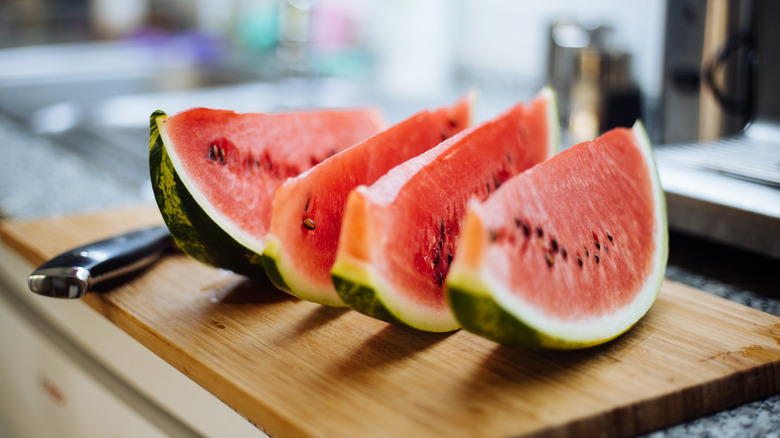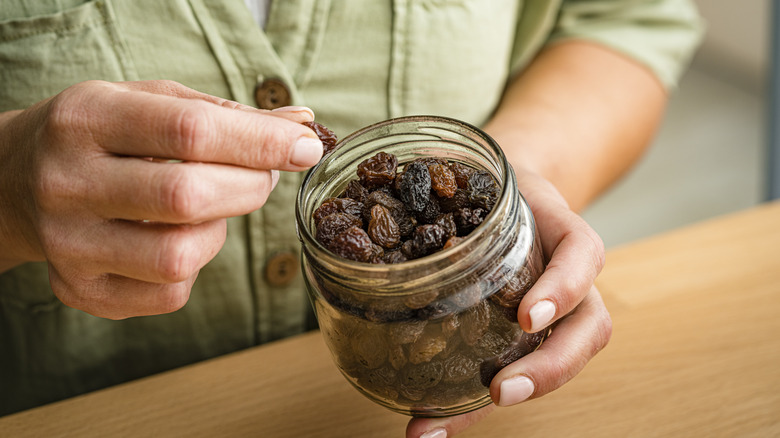Healthy Fruits You Should Avoid Eating If You Feel Bloated
While bloating is sometimes related to a health condition, most cases can be traced to increased gas in the intestines from food that has overstayed its welcome in the gut, explains the Cleveland Clinic. There are many healthy fruits that can protect against bloating. Others, however, can make our stomach feel even more uncomfortably full and tight than it already does.
For some people, fructose — also referred to as "fruit sugar" — can be one such troublemaker for the gastrointestinal tract. Healthy fruits like apples and pears are particularly high in fructose. With the skin intact, they're also rich in fiber. These two carbohydrates can be tricky for the body to break down, thereby making us more susceptible to bloating. Peeling and cooking your apples and pears, which are found in everything from salads to pies, prior to eating them may help alleviate tummy trouble for those with dietary sensitivities.
Along with apples and pears, here's our list of four more fruits to steer clear of if you're feeling particularly bloated and which fruits to reach for instead that may prove a little gentler on the belly.
Watermelon and plums can be a recipe for bloating
Although not as high in fruit sugar as pears and apples, watermelon does contain a fair amount of fructose, explains the Cleveland Clinic. Considered a high-FODMAP food (fermentable oligosaccharides, disaccharides, monosaccharides, and polyols), watermelon isn't easy for the body to process (per Memorial Healthcare System). Enjoying a few too many slices of this hydrating fruit may subsequently lead to constipation, diarrhea, or bloating. People with irritable bowel syndrome (IBS) will want to be particularly mindful to avoid watermelon.
The perfect mix of sweet and tart, plums also fall into the category of high-FODMAP foods. Registered dietitian Yi Min Teo told Real Simple that, for some individuals, it doesn't take much for plums to begin aggravating the gut. While some people may be able to tolerate multiple plums at one time, those with IBS may experience cramps and bloating after eating only a minor portion of a single plum.
Certain dried fruits can also increase the risk of bloating
Dried fruits can't be ruled out either when it comes to bloating. Experts at Women's Health explain that while dried raisins and prunes can help get things moving in our gastrointestinal tract, they're also packed with sugar and fiber. As our gut bacteria proceed to break down these undigested carbohydrates, gas is released in the process — hello, bloating. Pairing these dried fruits with plenty of water, however, can lower the risk of bloating and instead enhance the digestive benefits of raisins and prunes.
While apples, pears, watermelon, plums, and certain dried fruits may not be the best options when we're already feeling bloated, there are other healthy fruits proven to be a bit more stomach-friendly. This means reaching for fruits that contain lesser amounts of fructose, such as boysenberry, cantaloupe, kiwi, oranges, strawberries, and banana, suggests the Cleveland Clinic. Gastroenterologist Dr. Jacqueline Wolf offers a word of caution about bananas, however, writing via CNBC that ripe bananas, specifically, are high in fructose. Knowing this, if you're susceptible to bloating or if you have IBS, it may be best to stick to bananas that haven't fully ripened yet.


